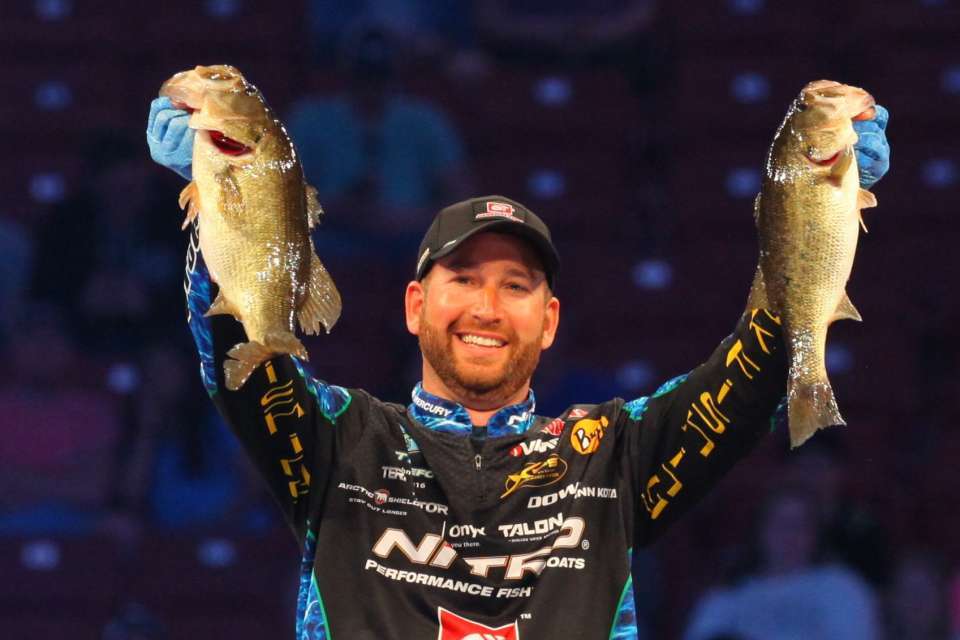
Through seven Bassmaster Classic appearances, Ott DeFoe has developed an enviable record, with four finishes in the top five, two 11th-place results and nothing lower than 25th. It may be a tournament where only one place matters, but you have to be near the top to claim the top prize, and he always seems to be nibbling around the edges of a win.
In this year’s Classic on the Tennessee River, his eighth overall – and possibly his last one for the foreseeable future – DeFoe will enjoy a home-field advantage that he’s never had before in a tournament of this magnitude.
“I’m going to make it a point to sleep in my own bed,” he said.
That’s worked for him before in Opens on nearby Douglas Lake, two of which he won in 2017 and 2018, but the Classic is a different animal. For years the “hometown curse” plagued favorites from Woo Daves to Rodney Wagley in various forms. Then Boyd Duckett won in 2007 in his home state of Alabama. Seven years later Randy Howell won in his adopted state of Alabama. South Carolina’s Casey Ashley and Oklahoma’s Edwin Evers made it a home-field three-peat in 2015 and 2016.
Anyone who thinks that DeFoe will be less potent on the Tennessee River than he is on Douglas needs to bone up on his fishing pedigree: “In local tournaments I’ve won far more money on Loudoun than I ever did on Douglas,” he said.
On the other hand, “I’ve fished three FLWs and a PAA event there and all I got was a consolation check in one of them. Back in the day it was good to me, but not in professional stuff.”
So which Ott DeFoe will show up? Will he be able to get over not only the demands of having a huge cheering section but also his history of finishing high but not in the top spot?
“A good showing ain’t what I’m fishing for,” he said. “I’ve built a career on high finishes, but this is a one shot deal, and a one shot deal at home doesn’t come around often. I’ve got to make this one count.”
He believes that’ll require a change in attitude to one that recognizes that a second-place finish is just about as valuable (or useless) as a 50th-place finish. Historically, he’s aimed for a floor of fishing well enough so that “you don’t have to work the Expo on Sunday, but that’s not the way to win. But you also have to make sure you don’t lose on the first day.
Look at Paul Mueller (at Guntersville). He just needed 10 pounds the first day, and he would’ve won. I’ve never had a single day that kept me from winning.”
The closest he came was at that same Guntersville tournament, in which Mueller was the runner-up to Randy Howell. At 1 p.m. on the final day DeFoe caught an 8-pounder, and without knowing that Howell was having the day of a lifetime, he believed that if he could cull out a 2-pounder with another quality fish he’d have a legitimate shot at the sport’s top prize.
“I was one bite away,” he recalled. “There are 5-pounders swimming around everywhere on Guntersville.”
That close taste of the trophy’s aura made him hungrier, but it was something that had driven him since he was a young child.
“From the time I went to my first Classic at the age of 9, it was my dream to fish one, I didn’t care where.”
Now he’ll get that wish, for the eighth time – along with four Forrest Wood Cup appearances – and he’ll get to take another shot on a playing field with which he’s intimately familiar. During his early days of competition on Loudoun he didn’t have side-imaging, but his ride-around before the lake went off limits confirmed much of what he already knew about the lay of the lake.
That solid body of knowledge will be tested and challenged by unprecedented conditions. The wettest fall and winter in DeFoe’s memory has dumped plenty of water into the river and likely rendered certain newly chocolatey sections unfishable.
“These are historic, epic conditions we’ll be dealing with,” he said. “Tellico is nearly at summer pool, and they’re going to be flowing massive amounts of water.” Given the importance of this event, and the rarity of the opportunity, DeFoe was prepared to take a risk in the form of a long run, but the tournament boundaries made that a non-issue. “It’s water on the other side of the bridge.”
Nevertheless, he likes his chances and is willing to shoot for the moon, even if it might mean a trip to the Expo on Sunday.
“I’ve never seen these conditions before so it’s not like I know exactly what to do,” he said. “But I should know how these fish would react to weird conditions. It’s going to be an event that changes throughout – water levels and current. That should play into my hands in some way.”

